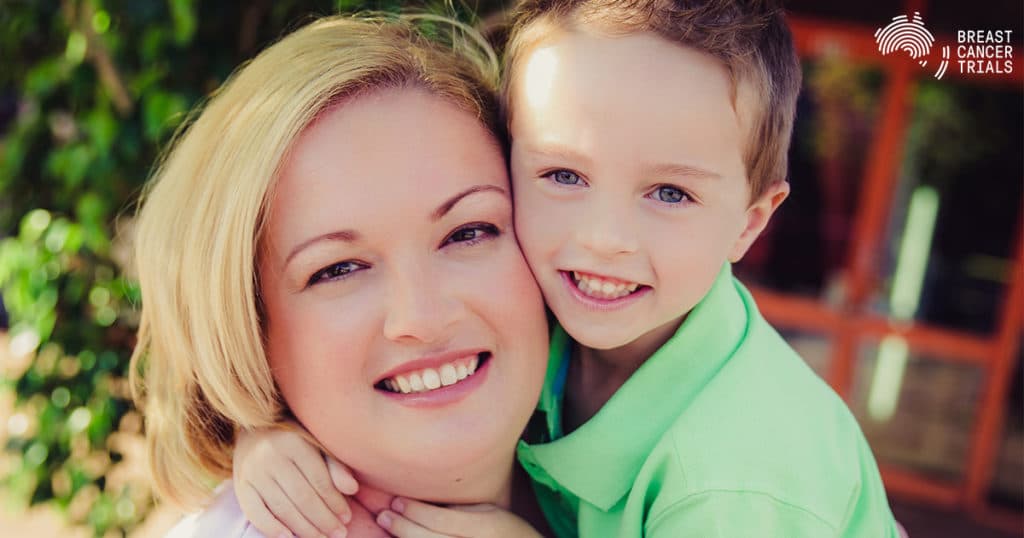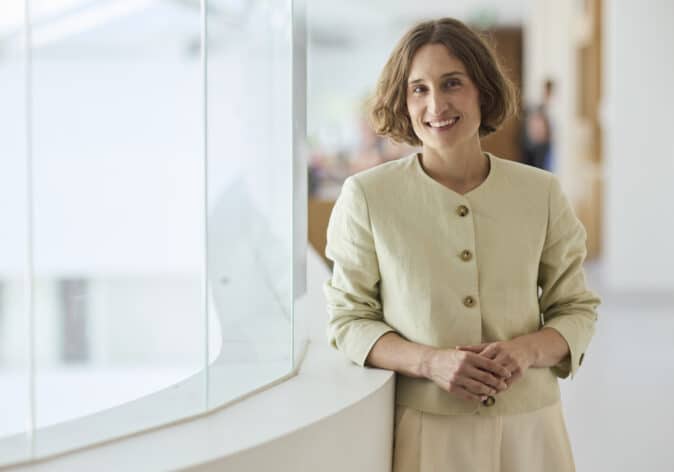The POEMS Clinical Trial: Natasha’s Experience
I was 32 when I was diagnosed. I found out one night when I was on the phone, laying in bed, touched my breast and found a lump. I went over to my aunt’s place, and she calmed me down, told me not to worry, that it wouldn’t be anything bad, but it ended up being breast cancer.
There was no history that I knew of but my mum died of ovarian cancer, so I’d been checking my ovaries, but to me, there was no link between breast cancer and ovarian cancer.
I was 32, I didn’t have any children, I wanted to be a mum, so yeah it was really unfair. My aunt was my rock – she gets me through it. We’ve always been close.
I went and met Fran that afternoon. She put the whole thing into perspective, calmed me down because I was very upset and worried about starting chemotherapy too soon for me. She suggested that I have the operation first rather than try and shrink the tumour.
Fran told me that there was a chance that this could do something to my ovaries and they may not work again. As a woman seeing my mum go through ovarian cancer, knew that there was going to be a strong possibility that I wasn’t going to be able to have children.
It might save my life but take away my becoming a mum. Fran said there was a clinical trial that was about to start and that I could be part of it. I was young and wanted to become a mother, and the POEMS trial was about trying to protect my ovaries from chemotherapy.
It was a no brainer. I knew that I wanted to be part of it and give it my best shot. I was ready to do whatever it took.
Listen to the podcast
Natasha was a participant on the POEMS clinical trial which was a breakthrough study for women with breast cancer and was aimed at preserving a woman’s fertility during her cancer treatment.
Participating in the POEMS Clinical Trial
To be part of the clinical trial I had to have injections a couple of days before I started each chemotherapy. I had six rounds of chemotherapy, so six injections of the drug. I was seeing Fran every three weeks at that stage, so she was keeping a good eye on me to see how I was going.
I remember she explained to me that the injection I would have, the drug, would put my ovaries to sleep and protect them from the chemotherapy. The idea was that the ovaries would then wake back up, I would get my period again and hopefully start releasing eggs and … like it never even happened.
After I finished my treatment, Fran said that two years before trying to have a baby was a good timeframe. It would let me get back to good health. I didn’t even think when started throwing up that there was anything wrong. I was throwing up every morning!
I must have been about eight weeks (pregnant).
I ended up saying something to my aunt and she said, “Maybe you’re pregnant?” I told her not to be ridiculous; my ovaries were still asleep last time I’d had an ultrasound done. I did that first (pregnancy) test, and initially I thought, “No, I’m not. How? I haven’t even had a period, so this can’t be right.” And then the fear set in that I might not even be able to have this baby, that there’d be something wrong, that it was too soon from treatment. That scared me. I thought, “What if this is the only child that I was ever … I wasn’t going to be able to fall pregnant again.”
So I was very over the top about checking to make sure that he was OK and I had a scan at 28 weeks that showed he was on the small side. I then had another scan at 30 weeks, and he hadn’t grown, so I felt that it wasn’t right. My blood pressure was up, so I spent the next three weeks in hospital. I ended up getting pre-eclampsia. He was five weeks early and spent a week in NICU.
I would tell any woman who was about to have chemotherapy that if there’s a clinical trial get involved with it. It let me become a mum, and that was one of the most important things to me. So if you are passionate about something, you’ve just got to do it.
He (son) only just found out this week that I’d even had cancer. It’s not something that I talk about now because it’s been nine years. For the first five years it becomes your life because you’re petrified of recurrence, but I’ve let it go now.
I told him that Mummy had had cancer and he said, “Have you really?” He knows that my breasts aren’t there anymore but I hadn’t actually sat him down and told him. But now that he knows, I’ll talk to him.
Life For Natasha Post-Treatment
It was a rollercoaster ride. I’ve been lucky that Fran has been so supportive. It’s only since I’ve had my breast removed that I haven’t seen her every six months. I could ring her up now and make an appointment, and she would see me.
She’s just such a wonderful doctor and person that she’s just on the pulse. She never leaves anyone behind. Just because I’ve got to this stage, I’ve been weaned off her so to speak. You put your life into her hands, and it’s just hard to explain that her decisions control what happens.
Sometimes I think about it and can’t believe it. But, then I think I’m meant to still be here, I’m meant to have my boy, and everything has worked out the way it was meant to work out.
At the time, mum was the only one who had had ovarian cancer, and she had six female cousins that had breast cancer. But I didn’t know that when I had it. So I also met a geneticist. I seriously didn’t think that I was going to have the gene (BRCA) even though it was all there that it would come back that I had it. My aunt got tested after her sister died of ovarian cancer and me with the breast cancer.
She’s come back clear. I’m so glad I did (get tested) now because there’s so much more they can do for you knowing you do have the BRCA gene.
Since my diagnosis, and since being told that there’s the BRCA gene in the family, two more cousins have got ovarian cancer. One has died, and one is now fighting for her life.
My aim is always to live the life my mum never got to. It was really difficult. She was the first one in our family to have cancer, but they’ve definitely come a long way from 1999 to 2008. The upside of this clinical trial, ten years on, is that it’s (this treatment) now available for all women going through any type of cancer.
I was the first one to get pregnant! I know that much!
Support Us
Help us to change lives through breast cancer clinical trials research



